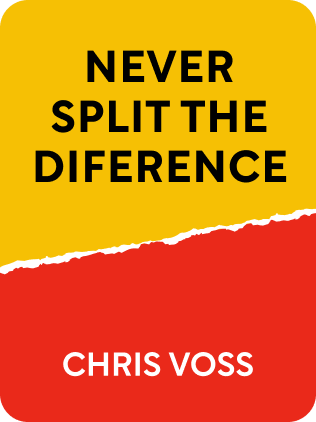

This article is an excerpt from the Shortform book guide to "Never Split the Difference" by Chris Voss and Tahl Raz. Shortform has the world's best summaries and analyses of books you should be reading.
Like this article? Sign up for a free trial here .
Is Never Split the Difference worth reading? What is the main factor, according to its author Chris Voss, that drives decision-making in a negotiation?
Chris Voss’s 2016 book Never Split the Difference (with co-writing assistance from Tahl Raz) was seen as an important contribution to the literature of negotiation theory and strategy. Voss’s main thesis is that good negotiation happens on the emotional level of the brain, not the rational level.
This Never Split the Difference book review takes a look at the book’s inspiration and background, intellectual context, and its key strengths and weaknesses.
Never Split the Difference: Negotiating As If Your Life Depended On It
In his book Never Split the Difference, Chris Voss aims to provide a comprehensive guide to negotiating theory and strategy, giving you the tools you need to negotiate successfully—whether you’re trying to get a raise at your job, buy a car at the right price, re-sign your lease at a reasonable rent, or any of the other everyday situations where we have to use negotiation to get what we want from somebody else.
Voss argues that human beings are inherently irrational and impulsive, willing to make decisions with incomplete information and disregard for their own basic material interests—if the decision satisfies a deeper emotional need. Your job as a negotiator, Voss argues, is to practice and display empathy toward your counterpart by understanding her emotions, learning to see the situation from her point of view—and, ultimately, getting her to feel comfortable enough with you to let her emotional guard down.
Understanding the emotional core of negotiation is the key to getting what you want from your counterpart, according to Voss. By tapping into your counterpart’s emotions—what they most desire to gain, what they most fear losing—you can get the decisive upper hand in any negotiation.
About the Authors
Chris Voss is a former FBI hostage negotiator, CEO and founder of The Black Swan Group (a firm that specializes in negotiation training), and adjunct professor at the University of Southern California and Georgetown University. During more than two decades with the FBI, Voss was the lead negotiator on several high-profile kidnapping and terrorism cases, including the 1993 World Trade Center bombing, the 1996 TWA Flight 800 explosion, and the 2006 Jill Carroll kidnapping case in Iraq. He has appeared on television to discuss his experiences and theory of negotiation, including on CNN Newsroom, Fox and Friends, and The War Room With Michael Shure.
Tahl Raz is a business journalist who has worked as a collaborator for several leading non-fiction books on business, negotiation, networking, and management. Raz is an expert in editorial and digital content strategy who offers freelance consulting services for enterprises looking for engaging and action-oriented content. Besides Never Split the Difference, his other collaborations include:
- Never Eat Alone: And Other Secrets to Success, One Relationship at a Time (2005) by Keith Ferrazzi
- The CEO Next Door: The 4 Behaviors that Transform Ordinary People into World-Class Leaders (2018) by Elene L. Botelho and Kim R. Powell
- Imagine It Forward: Courage, Creativity, and the Power of Change (2018) by Beth Comstock
The Book’s Publication
Never Split the Difference was published in 2016 by HarperCollins. The book was a commercial success and was a certified Wall Street Journal bestseller. Since publication, Voss has become a widely regarded expert in negotiation in popular media, and has made multiple appearances on podcasts, television shows, and filmed lectures.
The Book’s Context
While Never Split the Difference is not the only book to deal with negotiation tactics and strategy, it is notable for its primary author’s biography—a former top FBI hostage negotiator who teaches his readers to apply the skills he learned in that high-risk job to the world of everyday negotiation—as well as his fundamental theory of negotiation.
Voss’s book was seen as a direct challenge to Getting to Yes: Negotiating Agreement Without Giving In (1981) by Roger Fisher, William Ury, and Bruce Patton, which had long been considered the go-to text for negotiation. That book’s philosophy is based on the premise that human beings can use the rational and logical parts of their brains to overcome raw emotion to assess risks, weigh tradeoffs and formulate deals that mutually benefit all parties. Voss’s text, on the other hand, argued instead that human beings are fundamentally emotional and irrational beings and that the secret to successful negotiation is mastering and manipulating your counterpart’s emotional impulses.
Besides Never Split the Difference, other significant negotiating texts include:
- Getting to Yes: Negotiating Agreement Without Giving In (1981) by Roger Fisher, William Ury, and Bruce Patton
- Getting Past No: Negotiating in Difficult Situations (1991) by William Ury
- Bargaining for Advantage: Negotiation Strategies for Reasonable People (2008) by G. Richard Shell
- Negotiation Genius: How to Overcome Obstacles and Achieve Brilliant Results (2008) by Deepak Malhotra and Max Bazerman
- The Negotiation Book: Your Definitive Guide To Successful Negotiating (2011) by Steve Gates
The Book’s Critical Reception
Readers appreciated that the book focused on practical examples, without devoting too much time to academic theories or complex analysis of human psychology beyond the simple observation that emotional intelligence—not mathematical problem-solving skills—is the cornerstone of successful negotiation. Publisher’s Weekly also praised the book for its user-friendly style and colorful anecdotes from Voss’s storied career as a hostage negotiator, which helped illuminate the book’s core ideas.
According to some Amazon reviews, however, other readers found the book repetitive and overly long. They argued that it was too heavy on anecdotes and storytelling and too light on negotiation ideas and principles. Some reviewers also found Voss’s rejection of long-held negotiating principles (like the titular splitting the difference, looking for win-win solutions, or “getting to yes”) was too dismissive and ignored real-world negotiating scenarios where these alternative approaches could yield superior results to his methods.
Commentary on Book’s Approach
Voss begins by discussing the emotional component of negotiation and making the argument that tapping into your counterpart’s emotional drives and impulses is the key to getting what you want from them. He then highlights a range of tactics like listening actively, reflecting back, labeling, and calculated empathy that you can use to put your counterpart at ease and get them to let their emotional guard down. Voss argues that these tactics will put your counterpart in a position where they’re more willing to divulge crucial information that will give you the upper hand in the negotiation. He also analyzes the flaws of commonly accepted negotiating principles like “win-win deals” or “getting to yes,” before presenting some step-by-step scenarios for you to model your negotiation techniques from.
Throughout, Voss uses stories from his unique background as an FBI hostage negotiator and university professor to highlight the book’s main ideas and principles. He also uses hypothetical examples to give the reader a blueprint for how to apply his negotiation tactics in everyday situations.

———End of Preview———
Like what you just read? Read the rest of the world's best book summary and analysis of Chris Voss and Tahl Raz's "Never Split the Difference" at Shortform .
Here's what you'll find in our full Never Split the Difference summary :
- Lessons learned from years as an FBI hostage negotiator
- Why negotiation is about emotional appeals, not rational ones
- The 5 methods for tactical empathy, which gets you what you want by focusing on the other person's feelings






